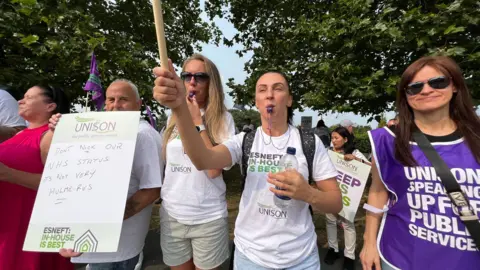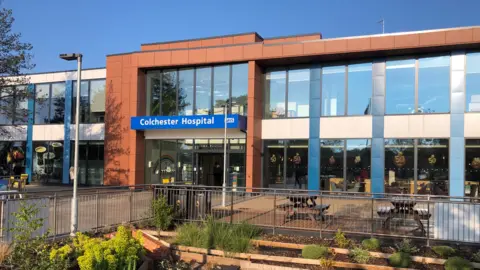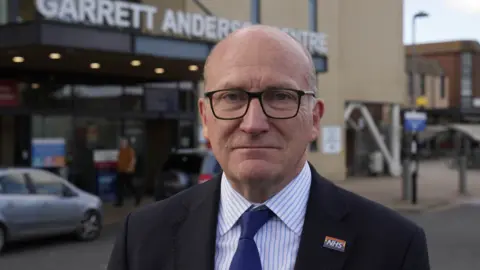Patient safety 'at risk during strikes' – union
 Stuart Woodward/BBC
Stuart Woodward/BBCHospital chiefs "risked patient safety" by bringing in "untrained" strike-breakers during industrial action, a union claimed.
Hundreds of cleaners, porters and caterers walked out at East Suffolk and North Essex NHS Foundation Trust (ESNEFT) sites in August in a row over privatisation.
Public service union Unison said temporary staff drafted in to Colchester Hospital were inexperienced in monitoring blood and oxygen levels.
The trust said many staff members had "kindly volunteered" to cover roles during the strikes, while external partners supplied people who were suitably trained.
Staff staged the industrial action from 19 to 23 August over plans to move their jobs out of the NHS.
Further action is planned at Colchester Hospital between 10 and 14 September.
 ESNEFT
ESNEFTIn a letter to ESNEFT chief executive Nick Hulme, Unison said the trust was "reckless" in bringing in strike-breakers from as far away as Newcastle.
The union claimed those drafted in were put up in hotels and given bus transport to the hospital sites – including Aldeburgh Community Hospital, Suffolk.
They were paid £27 an hour for a night shift and £17 for a day shift, it said.
'Cavalier attitude'
Unison also alleged that when strikers returned to work, they found milk and food left out beyond their use-by dates.
It added some patients did not receive at least one hot meal a day while caterers were picketing.
 John Fairhall/BBC
John Fairhall/BBC"ESNEFT's sticking plaster solutions last month show exactly why staff are taking action," said Unison Eastern regional organiser Sam Older.
"It’s no surprise the trust has taken such a cavalier attitude to patient safety.
"There’s overwhelming evidence that outsourcing leads to dirtier hospitals and higher infection rates, but trust bosses are ploughing on regardless."
A spokeswoman for the trust said members of staff who volunteered to cover their striking colleagues had undergone training first.
"Additional help was also sought from external partner organisations whose staff were also trained for the roles," she said.
"We recognise and uphold everyone’s right to take industrial action and we are very grateful to all volunteers and employees of other organisations who put patient care first.
"Our colleagues have demonstrated kindness, compassion and care during this time."
Follow East of England news on X, Instagram and Facebook: BBC Beds, Herts & Bucks, BBC Cambridgeshire, BBC Essex, BBC Norfolk, BBC Northamptonshire or BBC Suffolk.
